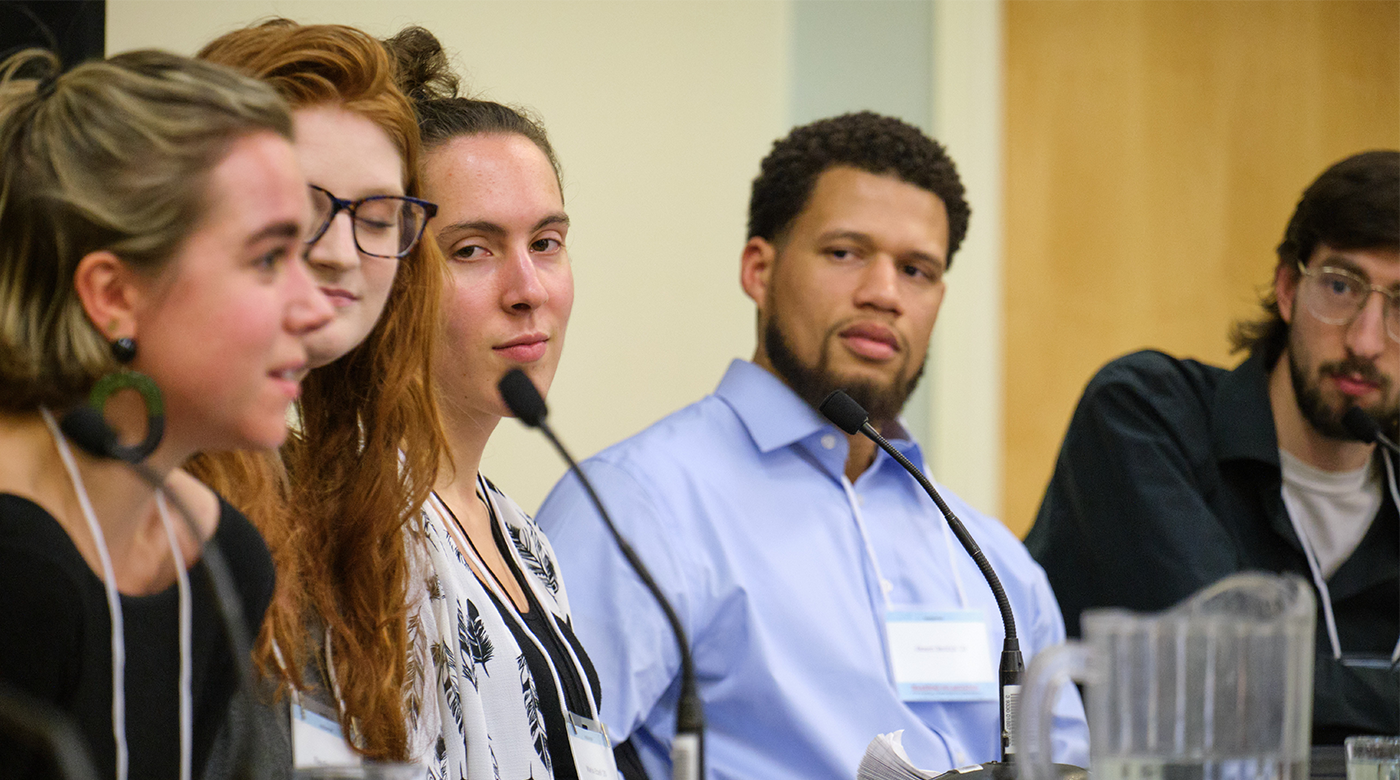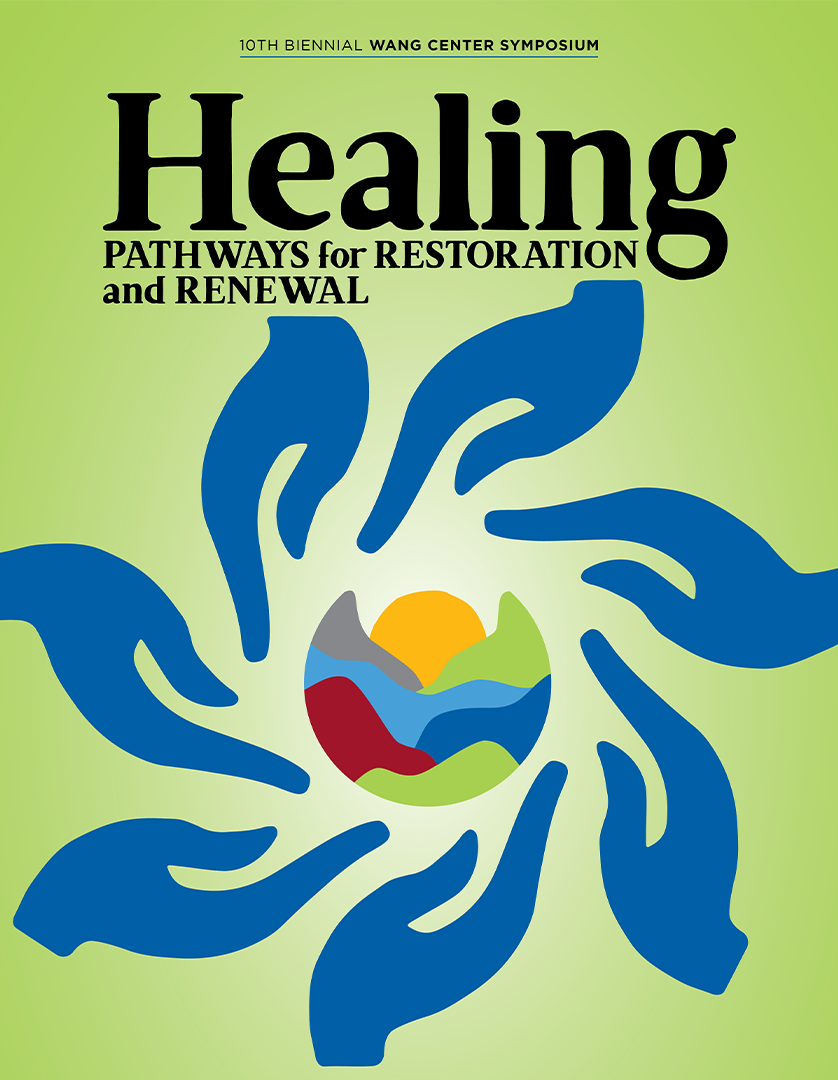Wang Symposium reaches across disciplines to find the power of healing

Image: PLU students take part in a panel during the 2020 Wang Center Symposium “Disarming Polarization: Navigating Conflict and Difference.” (Photo taken prior to COVID-19 safety measures.)
By Debbie Cafazzo
PLU Marketing and Communications Guest Writer
Two years ago, the Wang Symposium explored the phenomenon of political and societal polarization, and its effect on our world. This year, the 10th Biennial Wang Symposium comes full circle, with a focus on “Healing: Pathways for Restoration and Renewal.”
“Even as I was planning the 9th biennial symposium two years ago, I was already thinking that the next symposium would be on a topic that would bring forth ideas and practices about how to bridge polarization,” said Tamara Williams, Ph. D., executive director for the Wang Center for Global and Community Engaged Education.
The topic of healing soon took on more meaning, Williams said, given the deep wounds of racism, police violence, health inequities laid bare by the pandemic, mental health issues, tension at the U.S.-Mexico border and other issues that have risen to the fore.
This year’s two-day Wang Symposium, which takes place online March 9 and 10, will offer perspectives from academics, activists and practitioners across a broad spectrum of disciplines. The event features 12 back-to-back sessions with presenters who come from around the country and the globe, along with PLU faculty. Sessions include:
From Derry, Northern Ireland, Eamonn Baker and Maureen Hetherington have worked for decades on peace-building in the context of the sectarian violence known as “the Troubles.” Their keynote talk will describe how their work uses the healing processes of dialogue and deep listening.
Robert McKee Irwin, professor in the Department of Spanish and Portuguese and Deputy Director of the Global Migration Center at the University of California, Davis, will deliver a keynote titled “Humanizing Deportation: Research and Care in the Hérida Abierta,” that features the role of storytelling in healing.
Elena Calderón, University of Arizona doctoral student and formerly undocumented person, presents “UndocuJoy in Practice: Healing through Joy, Storytelling and Therapy.”
Sharon Suh, professor of theology and religious studies at Seattle University, explores trauma and healing from the perspectives of Buddhism and neuroscience, with attention to the experiences of women of color.
PLU alum Dawn Alger ’95, a San Juan Island-based nurse and gender-diverse patient advocate, joins her transgender son, Rigby Alger ’19, in “A Mother and Son’s Healing Journey through Gender Transformation.”
Award-winning filmmaker and professor at The Evergreen State College, Gilda Shepperd, discusses her documentary “Since I Been Down” that focuses on the role education plays in resilience and healing for people behind bars.
Valerie Segrest, an enrolled member of the Muckleshoot Indian Tribe and co-founder of Tahoma Peak Solutions, will discuss her work in the food sovereignty movement, using food security strategies rooted in education, awareness and overcoming barriers to tribal communities accessing traditional foods.
Chuck and Peg Hoffman, professional artists and former executive directors at Lutheran renewal center Holden Village, will reflect on the intersection of art, Earth and spirit that informed their successful advocacy for environmental remediation by a mining company in the Cascade Mountains.
The Wang Symposium concludes with Justin Spelhaug, who will deliver the 16th Dale E. Benson Lecture in Business and Economic History. Spelhaug leads the Tech for Social Impact group at Microsoft Philanthropies. He’ll explore the role that technology companies are taking in global efforts to fight inequality, eliminate poverty, protect the planet and transform local communities.
The symposium represents a collaboration with Gender, Sexuality, and Race Studies, the Diversity Center, Innovation Studies, the Department of Social Work, and the Dale E. Benson Lecture in Business and Economic History.
From the start, each Wang Symposium has been conceived as interdisciplinary and global in reach. Each is designed to serve the entire PLU community as it addresses issues of concern.
“The underlying assumption, of course, is that the issues the event addresses — along with possible solutions — requires the wisdom of many disciplines and seasoned practitioners,” Williams said. “Healing is no exception.”



